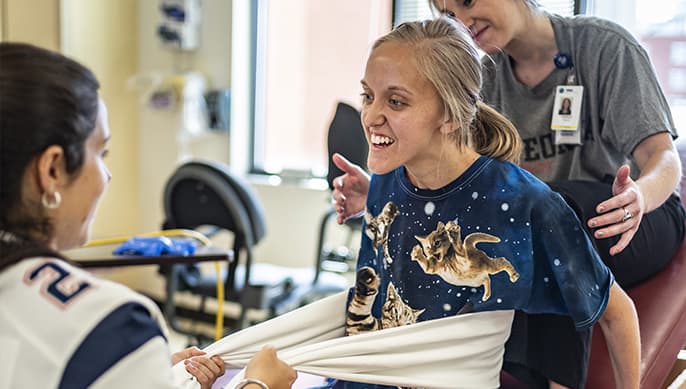Externship overview
This is an advanced intervention practicum involving assessment and therapeutic interventions with individuals with Spinal Cord Injuries (SCI), dual diagnosis (TBI/SCI), and other neurological disorders. An advanced student is generally defined as a fourth-year student (applying in the spring of the third year) in medical psychology, rehabilitation psychology, or neuropsychology tracks. The advanced student needs to have completed assessment and intervention curricula and completed at least one other external psychology practicum with a focus on psychotherapeutic interventions.
Externship location
Length of training
2 days/16 hours per week
- The length of training can be flexible depending on the program and practicum agreement.
- Thursdays are required, with externs picking either Tuesday or Wednesday as their other training day.
- Group supervision occurs on Thursday afternoons and is mandatory for all trainees and staff. The inability to attend group supervision because of other obligations/conflicts is an exclusion criterion for consideration.
Externship supervision
All students are assigned a primary supervisor. Each week, the student will receive at least one hour of individual supervision, in addition to one hour of group supervision on Thursdays. Additional informal supervision regularly occurs as the student manages the demands of clinical services. Styles and modes of supervision vary according to the supervisor. The student may also receive tiered supervision by experienced licensed professional counselors or a Rehabilitation Psychology Fellow. The student receives feedback on case presentation, performance in team meetings and seminars, consultative/supervisory work, writing skills, and overall professional conduct. Future career planning and interviewing skills are also addressed during supervisory sessions.
Externship rotations
Each extern will complete a total of four three-month rotations, so there will be ample opportunity to complete rotations in a variety of areas to provide a well-rounded training experience. The first rotation, which is mandatory, is to orient the extern to Shepherd Center and its culture, provide an in-depth overview and education of Rehabilitation Psychology, and mentorship regarding various aspects of professional development in preparation of internship and future practice.
The primary clinical population for this externship includes individuals with spinal cord injury. The most common precipitating factors leading to SCI seen in this facility include motor vehicle accidents, falls, gunshot wounds/assault, or neuromedical injury or disease, including multiple sclerosis, stroke, or tumors.
We utilize evidence-based, biopsychosocial approaches to evaluation, intervention, and rehabilitation. Inpatient evaluations include clinical bedside evaluations, patient and family psychosocial interviews, neurobehavioral assessments, cognitive screeners, and may include brief cognitive testing assessment (1.5-2 hours) batteries prior to discharge from the inpatient unit, if/as deemed clinically warranted based on clinical presentation.
A list of externship rotations is included below. It should be noted that other possible rotations could occur depending on the extern’s experience and interests.
